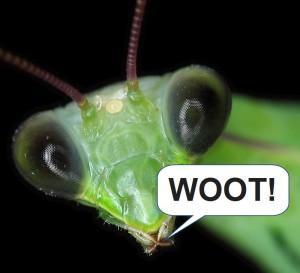A massive new study in Science has resolved the timing and pattern of insect evolution. Insects originated ~479 million years ago (mya), some began flying ~406 mya, the major extant lineages appeared ~345 mya, and metamorphic insects appeared ~140 mya. This fossil and gene based phylogeny is a fantastic advance in our understanding of the tree of life, which is better expressed as the ball of life. When considering this ball, it is sobering to realize that microbes are the most speciose and certainly the most important — Metazoans or Animalia are entirely dependent on microbes. If microbes were to go extinct, all other life forms would follow in short order.
It is equally sobering to realize that there are 1,659,420 known species in the animal kingdom and the most successful or diverse phylum is Arthropoda, which includes insects, arachnids, and crustaceans. A recent taxonomic survey indicates there are 1,302,809 species of arthropods, or about 78.5% of the total. Mollusca is the second largest phylum with 118,061 species. Craniata, which includes vertebrates, consists of 85,432 species (including 19,974 fossil species), or about 5 percent of the total. Among these, there are 35,644 species of fishes, 7,171 species of amphibians, 15,507 species of reptiles, 11,087 species of birds, and 16,014 species of mammals. The latter, to which most of us default when we think or say “animals,” represents 1 percent of the total. Within this one percent, there are ~300 primate species, a number so small that it looks like this: .00024 of the total. Among primates, there is only a single species of extant hominin: Homo sapiens.
Because this species is the only one which studies and writes about evolution, our histories tend to be progressive. As we usually tell the story, the evolution of life has been largely about trends towards complexity and intelligence: the evolution of life is presented as a glorious unfolding toward us, and perhaps our favorite fuzzy mammalian relatives. This is of course solipsistic and unwarranted. If microbes, insects, fishes and that often forgotten phylogenetic group of organisms we call “plants” could write evolutionary history, the stories would be much different.
Life originated on earth in non-complex or simple forms and, after over 3 billion years of evolution, the vast majority of life remains non-complex and relatively simple. When all organisms are considered and not just a small number of “advanced” or complex outliers, evolution does not present as progressive. Seen from this larger perspective, there have not been any generalized trends.
Long before we were here, simple or “primitive” forms dominated earth. Now that we are here, they still dominate it, even if our primate-vision prejudices prevent us from seeing it or them. Long after we have finished our epoch making domination, or when the Anthropocene runs its sloughing course, the new epoch will get a more traditional name. “Insectocene” seems as good, and likely, as any. These simple forms have always been dominant on earth, so they cannot really inherit what has always been theirs, but they will certainly inherit an earth substantially different from the one they have known for the past 12,000 years. But they will adapt and diversify, just like they always have, through the earth’s many epochs, cycles, and perturbations. From their perspective, future prospects might even look like progress.


